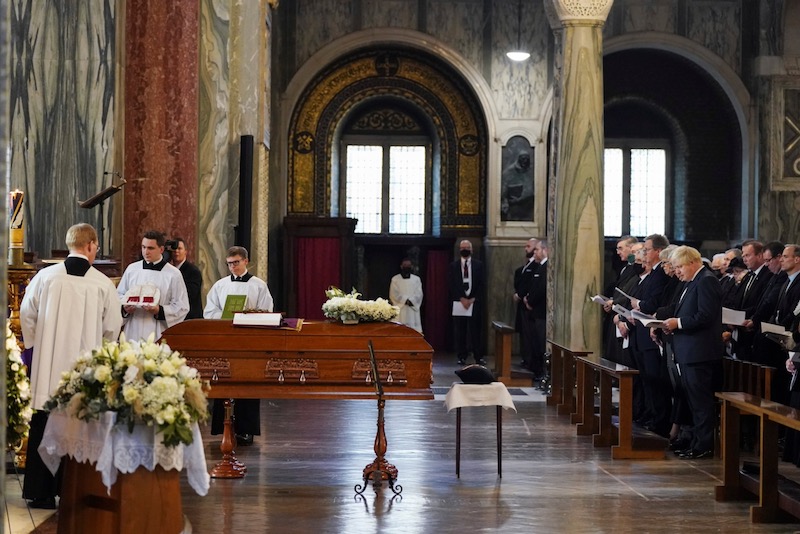The House of Lords has debated an amendment to the Police, Crime, Sentencing and Courts Bill on ministers of religion having access to crime scenes.
The amendment was tabled by Conservative peer, and former Lords Leader, Baroness Stowell of Beeston and Crossbench peer, Baroness Masham of Illton, following the murder of Sir David Amess last month.
The Catholic Union noted that it was tabled as a so-called “probing amendment” to give peers the opportunity to debate the matter and provide Government with an opportunity to respond. The debate took place the day before Sir David’s funeral in Westminster Cathedral on Tuesday 23 November.
The Catholic Union briefed peers ahead of the debate on the importance of priests and other ministers of religion being able to visit those who are sick or dying.
While not a Catholic herself, Baroness Stowell described the news that Sir David’s priest, Fr Jeffrey Woolnough, had not been able to administer him the Last Rites on the day he died as “surprising” and “upsetting”. She said it was “reasonable to expect the police to have an understanding of Christianity” given it remains the dominate religion in this country.
A number of other peers contributed to the debate, that took place in a late night sitting of the House of Lords last week. The Church of England Bishop of Leeds, Nick Baines, called for “deeper religious literacy in our public life” and said society needed to challenge the view that religion was solely a private matter. Baroness Masham highlighted the need for a police force that was “kind, honest, and well-trained” to prevent what happened with David’s priest from happening again.
Responding to the debate, Home Office Minister, Baroness Williams of Trafford said that as a Catholic she recognised the importance of these matters. She said there was a “sensitive balance to strike” between respecting the duties of the police and wishes of the individual.
Baroness Williams expressed concerned that new law creating a presumption for priests to access a crime scene “had the potential to prevent the police from doing their job effectively”, but she committed to meet representatives from the Catholic Union to discuss the matter.
Baroness Williams also welcomed the creation of a joint group between the Catholic Bishops’ Conference of England and Wales and the Metropolitan Police to look into whether changes to guidance or training are needed.
The amendment was not pushed to a vote – as is customary for Committee stage amendments – and the Bill continues its passage through Parliament.
Catholic Union Chairman, Rob Flello, said: “People across the country were shocked by David’s murder but for Catholics in the public eye his death is a particular blow. David was a committed Catholic parliamentarian and friend to the Catholic Union. I had the privilege of serving with him in Parliament for 12 years and we worked together on a number of issues close to both our hearts as well as the common ground we shared as fellow Catholic MPs.
“What made the tragic events of that day even harder to accept was the fact that David was denied the final sacraments. This has caused deep unease in the Catholic community. It also touches on a much wider concern about whether society truly understands the importance of faith to peoples’ lives.
“Catholics are not seeking special treatment. We want to see everyone’s faith respected during their life and death. What happened to David cannot be allowed to happen to anyone in future.”
The sacrament of the last rites, also known as extreme unction or anointing of the sick, is the anointing given to those who are gravely ill and considered close to death. The Catholic Church teaches that the effects of this sacrament are the strengthening and comfort of the soul, the remission of sins, and the possible restoration of bodily health.
The rite in which the sacrament is offered includes the sacraments of penance and the Eucharist, followed by the sacrament of unction itself. It may be received conditionally up to three or four hours after apparent death.
The Catechism of the Catholic Church states: “By the sacred anointing of the sick and the prayer of the priests the whole Church commends those who are ill to the suffering and glorified Lord, that he may raise them up and save them. And indeed she exhorts them to contribute to the good of the People of God by freely uniting themselves to the Passion and death of Christ.”



 Loading ...
Loading ...